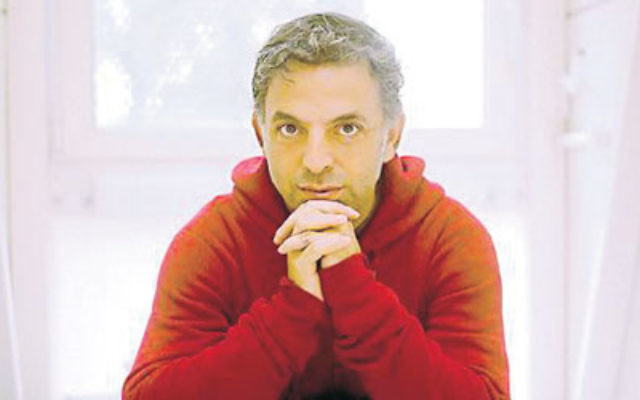Keret’s personal journey
Acclaimed Israeli writer Etgar Keret has penned his most personal book yet, which he has controversially decided not to publish in Israel.
AUTHOR Etgar Keret has been hailed as “one of the most important writers alive” by Clive James and “the voice of the next generation” by Salman Rushdie, yet despite accolades from literary figures and fans worldwide, the Tel Aviv writer admits that, when it came to penning his memoir The Seven Good Years, he felt like a novice.
Despite being a household name in his birth country, the 47-year-old author and screenwriter made the somewhat remarkable decision not to publish the intensely personal book in his native tongue of Hebrew, nor in fact to publish it in Israel.
And it’s a decision he stands by.
“When you publish a book, you open it to some kind of criticism – people can say whether it’s interesting or boring – but when you write about your family, people can say whether your family are interesting or boring too,” he says.
“It wasn’t that I didn’t want people in Israel to read the book, but I just didn’t want it to be shoved down their throats. I wanted to keep a bit of distance from it.
“Writing is all about freedom for me … and knowing that I could say ‘No, I don’t want to tell it here [in Israel] in this language – in a strange way, this gave me this kind of childish feeling of freedom. There was something liberating about that.”
Speaking to The AJN by phone from New York, where he is currently running a writing workshop, Keret reveals that penning his memoir wasn’t exactly on his must-do list. Far from it, in fact.
“Since I started writing, when I was 19, I never had any wish to write non-fiction,” he admits. “Even as a child, I never wrote a diary.
“For me, writing was something that had to do with inventing stories and making up characters. It was very much like going out on an adventure – sitting down and writing something and not knowing how it was going to end.
“But when you write non-fiction, the entire attitude towards it is different, as is the joy that comes from it.”
Nine-and-a-half years ago in Tel Aviv, on the same day that a terrorist attack shook the city, Keret and his screenwriter wife Shira Geffen welcomed their son Lev into the world.
“The first personal non-fiction piece that I wrote – not an op-ed – was about the day my son was born, whicah became the opening piece in the book,” he explains.
“I think there was something with his birth – some kind of primal responsibility of documenting that moment.
“Before I became a father, I believed in this kind of never-ending present. But having a child gave me a strong sensation of the future, so I had this need to write stuff – both to keep it, but also to explain things to myself. Writing helps you to understand your emotions.”
His recent books include a collection of his own short stories titled Suddenly, a Knock on the Door, and a collection of short stories by Israeli writers that he co-edited for Tel Aviv Noir.
When Keret’s beloved father Efraim, who, along with Keret’s mother Orna, was a Holocaust survivor, was diagnosed with a terminal illness, Keret instantly knew what his next project would be.
“I felt that I needed to write a book that would talk both about me as a new father and as a child to my own father,” he says.
“It would be one that would include all those thoughts and emotions about my family, about this theme of continuation and their personalities as Holocaust survivors. It would put it all into the one context.”
The result is The Seven Good Years, a witty, somewhat whimsical and profoundly poignant account of a crucial period in Keret’s life, beginning with the birth of Lev and concluding with the passing of Efraim three years ago.
“It was very easy for me to write it,” Keret says, adding, “but it becomes more complicated when you want to share it with people or publish it.”
What did Keret’s family members think of the memoir, which is laden with frank and funny tales of their everyday encounters?
“My mother read and it she really liked it. My wife and son read it too, and they liked the concept of it. My wife especially likes it when I write about our arguments. She likes her character in the book,” he says.
Keret knows, too, that his father would have been glowing with pride. After all, he says with a laugh, how could he not have been?
“When I began writing, every time I would write a story I would give it to my parents, and each time they would say ‘It’s amazing, it’s so great! Whoa, that’s a wonderful story!’” he recounts fondly.
“After giving them my 20th story, I said ‘How can all the stories be amazing?’ and they looked at me and said, ‘How can they not be amazing? They’re by our son!’ So that idea of unconditional love is something that has been very strong in my life.”
Already at work on his next project, Keret is in the process of developing with his wife a quirky French TV series about a time-travelling real estate agent. In 2007, Keret and Geffen won the Cannes Film Festival’s Camera d’Or award for their movie Jellyfish.
There’s certainly much, it seems, to continue to look forward to from this master of storytelling.
The Seven Good Years is published by Scribe Publications, $27.99 (rrp).
REPORT by Jackie Brygel


comments